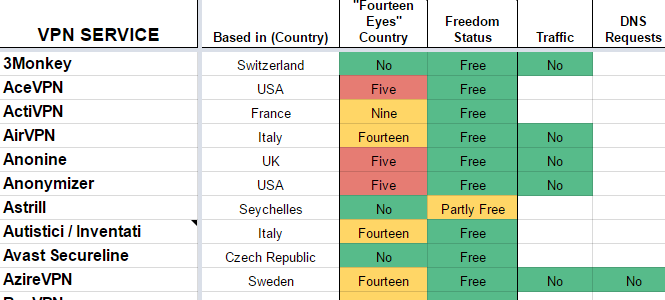Research before subscribing to a VPN
While many would probably disagree, I consider VPNs essential when it comes to improving your privacy and security on the Internet.
The past couple of years have seen a surge in VPN services that all try to get a piece of the market that grew significantly ever since Edward Snowden revealed how national agencies tracked users across the Internet.
There are big differences between VPN services, from price and availability to privacy and traffic.
While it is easy enough to sign up for any one of those services, it is usually not a good idea to do so before you research the service to make sure it offers all the features you require of it.
Not all questions may be relevant to your use case. If you just want to improve your privacy and security for regular web browsing for instance, you may not care about logging, or whether a service supports P2P or media streaming.
Or, if you want to protect your data while traveling and using hotel Wi-Fi or public connections, then you may not really be interested in anonymous payment options.
Basic questions

Basic questions can be answered quickly usually by browsing the website of the VPN service. They help you sort out the services that are not suitable for you, and help you get a clear comparison of different services that may be suitable.
You should get answers for the following questions:
- How much does the service cost (discounts)?
- Which plans are offered?
- Unlimited bandwidth / traffic?
- What are the payment options (important for anonymity, Bitcoin, Gift cards, cash)?
- Which devices are supported (desktop, mobile, router)?
- How many devices can connect simultaneously to the VPN?
- How many countries and servers are available?
- Is a free trial offered?
- Money back guarantee?
- Support availability?
Advanced questions
Advanced questions dig deeper into the service. They address privacy and security related questions but also others that are more technical in nature.
- Does the service or used third-party services keep any logs? If so, for how long and what.
- Which company operates the service and what is the company's jurisdiction?
- Does the company own and control the servers the VPN operates from, or are they controlled by third-party companies?
- Does the company who operates the VPN share data with third-parties?
- Which encryption algorithms and protocols are supported (weakest, strongest)?
- Does the service offer DNS, IPv6 and WebRTC leak protection?
- Is a Kill Switch supported which turns off traffic if the connection to the VPN drops?
- Is the company using a Warrant Canary?
- What's the actual download and upload rate you get when using the service (works best for services that offer free trials).
- Check the company's Privacy Policy and Terms of Use for additional information about logging, blocked and allowed services, cooperation with authorities and more.
Situational questions
These questions are important to some users but not all users.
- Does the service allow P2P traffic?
- Do Netflix or other streaming services block the VPNs IP range?
- Is the VPN usable in country xyz?
Closing Words
Some questions may be hard to answer. If a service does not offer a free trial or speed test for instance, you cannot really say anything about your throughput unless you subscribe to it and test it.
The same may be true for information that the company that operates the VPN does not reveal on the website.
The only option you have then is to contact them to ask them directly about it, or drop them and check out other services that are more open about it.
A good starting point for your research is this VPN comparison chart on Google Docs. It answers many of the questions which helps you sort out VPN providers that are not suitable for your use cases.
It is still a good idea to verify the findings.
Now you: Did I miss a question? Let me know in the comments.
This article was first seen on ComTek's "TekBits" Technology News

- Log in to post comments